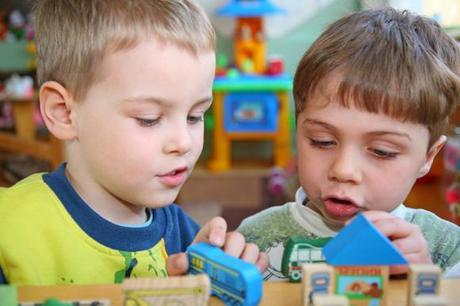(Isobel’s nursery’s child safeguarding policy dictates no photos, so I have used a stock image here instead.)

“I like Isobel.”
“Can I climb on Isobel’s chair?”
“Isobel is a fairy. Can I be her friend?”
These were the sort of questions being asked of Isobel’s one-to-one assistant, Clare, by her designated age group. It was her first settling-in session in nursery, and already, she was popular with the children there.
Was it her hair? Her perfectly symmetrical, heart-shaped face? Her placid conduct, brought on by pure, soundless curiosity? Whatever the reasons, it seemed that wherever Isobel went, so did a dozen three-year-olds. They would read books with her, stroke her hair gently, talk to her – and even tried to catch bubbles for her.
Still in their formative years, these kids had not yet acquired the full prejudices experienced by deaf and disabled people in today’s society. Their curiosity knew no bounds, and I even encouraged Clare to invite questions from them by way of increasing disability awareness and, hopefully, equality. After all, prejudice usually comes from ignorance – and an unwillingness to learn from those who are different to them.
A Triton chair exactly like the one Isobel had at home had been supplied to the nursery. While Clare pushed her up a gentle, winding garden slope in it, three girls formed a train in pushing her from behind, while a dark-haired boy in a striped polo-shirt clasped hands with Isobel and walked alongside.
Isobel loved watching the children chase man-made bubbles in the garden. She sat close by with Clare, laughing and laughing until she got the hiccups. ‘Heeeeeh, heeeeeh, heeeeh,’ she went, the guffaws coming from so deep within she showed a full set of milk-teeth.
The next day – when Isobel had her second settling-in session – my presence was not required. She’d taken to her new surroundings with such ease that I had no qualms about leaving her there this time.
Upon Isobel’s return home from nursery, Miles reported a surprising change. ‘She did a lot of walking,’ he said, ‘AND she grabbed hold of the spoon at snack-time and fed herself.’
I was amazed. Never mind practising walking in new company – something she’d never done before – Isobel hadn’t fed herself since the tail-end of 2010. I could only conclude that watching other non-disabled children go about their business in the nursery had brought out a new competitive streak – living proof that it already constituted a healthy learning environment for her.
I was right to push for Isobel to have this opportunity as part of her SEN statement. She did need to be around non-disabled children regularly, both for her and their sakes. Of course Isobel is a fairy. The bubbles of prejudice were there for her to pop.
Related articles:
- Inclusion in education is an afterthought (themostynthomasjournal.com)
- News just in (themostynthomasjournal.com)

